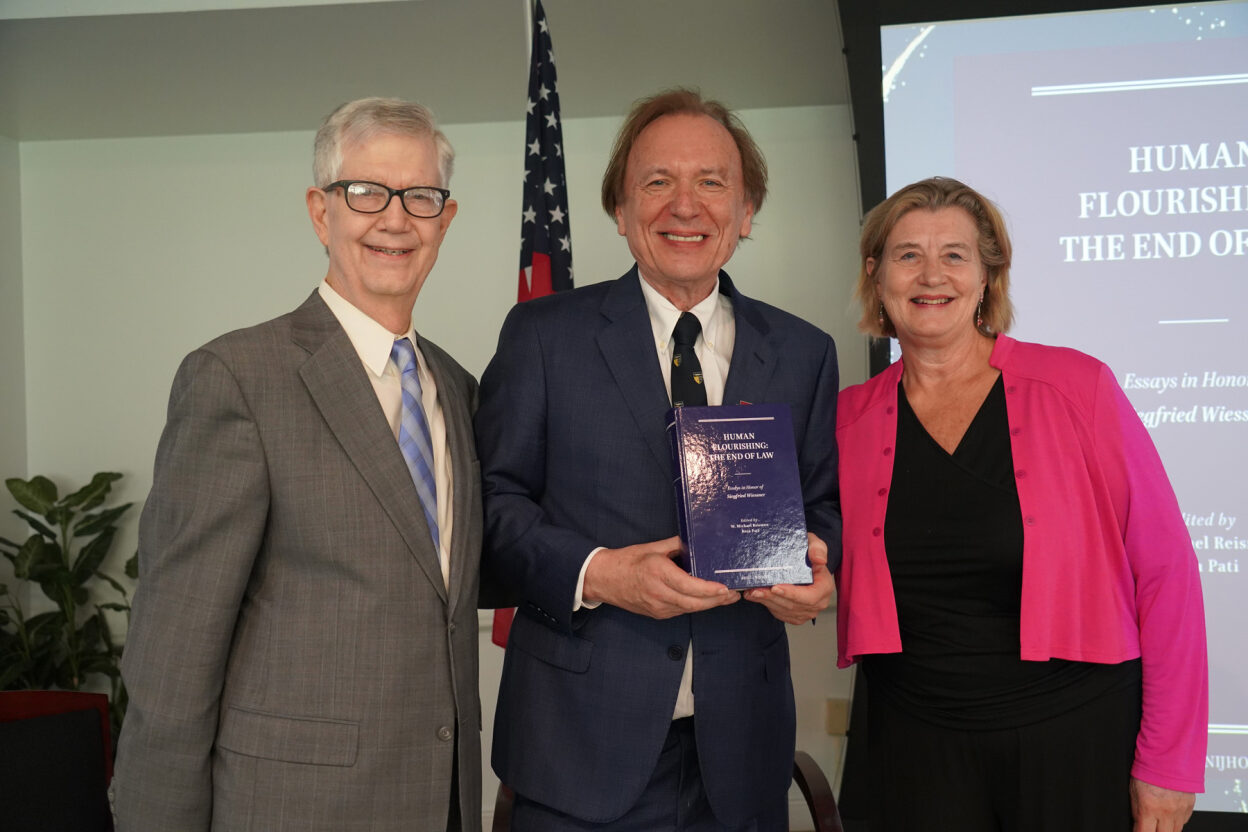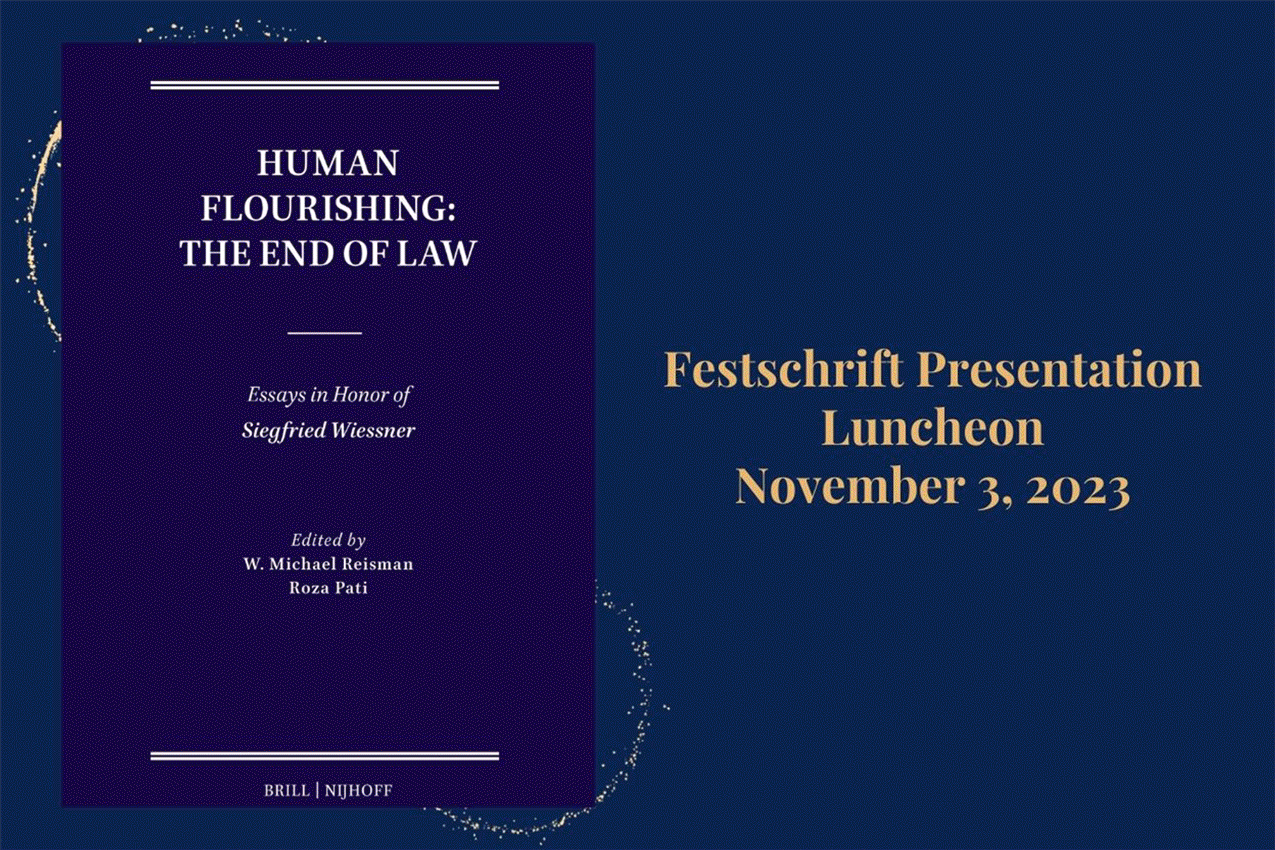

On Friday, November 3, 2023, an extraordinary event took place at St. Thomas University Benjamin L. Crump College of Law: the launching of a book of essays, which a United Nations dignitary called “an exceptional piece of legal work that places the law in its largest strategic context,” titled Human Flourishing: The End of Law: Essays in Honor of Siegfried Wiessner — a Festschrift celebrating Professor Wiessner’s lifetime work at the occasion of his 70th birthday. Dr. Roza Pati hosted and coordinated this event with unequalled focus on substance, inclusion, elegance and style.
A Festschrift is a unique honor in age-old University tradition, awarded to scholars respected by their peers with original contributions in areas in which the honoree made his distinct academic and policy impact. A Festschrift is also a celebration of scholarship and of scholars who advance the legal thought, law, policy – decision-making at all levels. Professor Michael Reisman from the Yale Law School, Professor Wiessner’s lifelong mentor and friend, and Professor Roza Pati, St. John Paul II Distinguished Professor of Law and Co-Director of our Graduate Program in Intercultural Human Rights, edited the book, published by the leading Dutch publishing company Brill-Nijhoff. Reflecting the depth and breadth of Professor Wiessner’s writings, scholars from all six inhabited continents contributed 39 thought-provoking articles. They explored topics as diverse as theory about law, human rights, the rights of indigenous peoples, the rule of law, constitutional law, the rights of migrants, international investment law and arbitration, space law, the use of force — all integrated by the problem- and policy-oriented framework of what has come to be known as the New Haven School of Jurisprudence. The book’s title “Human Flourishing: The End of Law” reflects Professor Wiessner’s conviction that the purpose of law ought to be to allow humans to achieve their full potential – to thrive and develop, materially and spiritually, under the law.
The event reflected the deep impact of the honoree’s path-breaking ideas and the abiding respect and affection of his students and scholarly friends he has earned since the beginning of his academic career. It started with a prayer by Father Paul VI Karenga, LL.M. and J.S.D. Graduate in Intercultural Human Rights, in the University’s Catholic tradition. Jacob Covas and Abdulmajeed Alqassem, J.D. Candidates, followed with prayers from the Jewish and the Muslim faiths. Students Celeste George, LL.M Candidate ’24, and Alyssa Gagnon, J.D Candidate ’25 were directed the event with eloquence and grace, serving as its emcees.
President David Armstrong and Dr. Roza Pati, St. John Paul II Distinguished Professor of Law, delivered the opening remarks at the event. President David A. Armstrong expressed his appreciation for all participants and conveyed his privilege of being one of the contributors to the book. He presented the honoree as a “modern-day Alexis de Tocqueville,” a “foreign-born champion of American democracy and human flourishing,” one “who will be remembered for generations to come.” Dr. Roza Pati thanked all who helped her make the event a success and conveyed her privilege of working with Professor Michael Reisman as co-editor of the book, and with the forty-three contributors, some of the world’s foremost experts in international law and other areas of law – all of them dedicated to human flourishing, human dignity for all persons and the whole person. She called the opportunity to edit the book on Human Flourishing to be “an honor and a blessing,” and in full harmony with the mission of St. Thomas Law and the ideals it stands for.
Dean Tarlika Nuñez Navarro focused on scholarly excellence as an abiding goal of the College of Law. She spoke about Professor Wiessner’s exceptional qualities, describing him as the kindest, most appreciative, and grateful professor she has ever encountered. She presented Professor Wiessner as a model in that area for our new, young faculty, and she announced his appointment as Associate Dean for Scholarship and Faculty Development. She conveyed that the aim is to inspire others to follow his lead and emulate the shining spirit that he brings to the institution each day. The Dean expressed her admiration by directly addressing him: “May we all strive to be more like you every day.”
Professor Michael Reisman, the foremost international legal scholar of our time, who has worked with Professor Wiessner on many projects, gave an exceptional speech on the honoree as a scholar and as a person: a brilliant, most treasured and loyal friend. He said: “Throughout the corpus of Siegfried’s written work, he explicitly commits himself to a public and a civic order which recognizes the dignity of all persons and undertakes to nurture the abundant shaping and sharing of all values…By his nature, he always practices human dignity with respect to everyone he encounters, regardless of where they are in the Great Chain of Being and regardless of their social or professional status… Siegfried’s practice of Martin Buber’s ‘I-thou’ relationship is baked into his being.” Professor James Anaya, leading scholar on international indigenous law, praised his close collaboration with Professor Wiessner and his spearheading of the development of rights of indigenous peoples to their lands and resources, their cultural heritage, and autonomy, as Chair of the International Law Association Committee on the Rights of Indigenous Peoples. He recalled their common venture to the Awas Tingni community in Nicaragua, place of the first case recognizing land rights decided by the Inter-American Court of Human Rights. Associate Dean John Makdisi spoke about the genesis of the LL.M. and J.S.D programs, founded by Professor Wiessner, and how they have become a shining example of academic excellence, thanks to the tireless efforts of Dr. Siegfried Wiessner and Dr. Roza Pati. He emphasized the pivotal role that the program has played in shaping the careers of numerous students and the transformative impact it has had on the legal landscape.
Many other speakers joined in this grand celebration, showing their appreciation for the honoree and his contributions to the legal community. Prominent figures from all over the world sent video messages. Dr. Ram Jakhu, a highly respected professor of space law at McGill University in Canada, expressed his admiration for Professor Wiessner’s work and wished him all the best for his future endeavors. Dr. Wang Guiguo, a renowned professor at Zhejiang University in Hangzhou, China, praised Siegfried’s efforts in advancing legal education and research. Dr. Mireya Peña-Guzman, a distinguished representative of the United Nations in the Dominican Republic, expressed her gratitude for Siegfried’s mentorship and support, which had been instrumental to her success. Former Associate Dean of St. Thomas University College of Law, Professor Jay Silver thanked Professor Wiessner for all he has given to the common good. He recalled that he had the great good fortune to have worked closely with Siegfried, and distinguished three dimensions of his contributions to law, law school, and to the global interest: Siegfried as “a sought-after influential voice in the global stage for human rights,” one who brought international movers and shakers in the global field of law to teach our St. Thomas’s students; a person with unwavering commitment to human rights and one who has mirrored the obligation of law faculty to the underprivileged as leadership by example; a wonderful mentor and friend. Dr. Ibrahim Salama, a high-level representative of the United Nations in Geneva Headquarters, remarked on Siegfried’s outstanding leadership and commitment to human dignity for all. Dr. Denise Wallace, Vice President and General Counsel at Florida Agricultural and Mechanical University (FAMU) and a distinguished St. Thomas University alumna who holds both of its J.S.D. and LL.M. degrees, emphasized the positive impact Siegfried had on her life, stating that she would not be where she is today without his guidance and support. Professor Jaime Olaíz Gonzalez, from Pan-Americana University in Mexico, described Siegfried as a role model, as someone whose influence was not limited to the theoretical aspects of law but extended to exceptional impact on students’ lives, and to the legal profession.
A highlight was the lively exchange, in interview format, between Dr. Stephan Wilske, leading German practitioner in international arbitration, and the honoree. It focused on their time of assistance to Professor Hans von Mangoldt, son of the main drafter of Germany’s 1949 Constitution and its dedication to the untouchability of human dignity, as well as the honoree’s statement that law ought to serve human beings, not the other way around. It also highlighted the honoree’s original contributions to the jurisprudence of Germany’s highest court on procedural protections for asylum seekers, and to the U.S. Supreme Court on the international arbitrability of U.S. antitrust claims via an amicus brief by his Washington, D.C law firm of Wilmer, Cutler & Pickering. It also referred to Professor Wiessner’s doctoral dissertation, novel indeed, on the transnationally common legal consequences, the function of nationality. Mr. Kirke Kickingbird from Hobbs, Straus, Dean and Walker, LLP, leader of the Kiowa tribe, brought a personal touch to the event, regarding the beginnings of Tribal Sovereignty Symposia at St. Thomas, and the transformative impact of Susan Jane Ferrell on the honoree.
On behalf of many friends and colleagues, Assistant Dean of Experiential Learning Ana Vallejo and Professor Christian Gonzalez-Rivera gave him a “token of appreciation,” i.e. a sculpture by Frederic Remington on the Indian heritage of the American West.
Professor Gordon Butler recalled the mentoring by Professor Wiessner of his first articles at St. Thomas, and his continued efforts to share his comments with other young faculty at that time and beyond. Ms. Lindy Melman, eminent publisher of Brill, recalled the extraordinary work and commitment to excellence that Professor has in the series on Studies in Intercultural Human Rights that he serves as editor. Ms. Melman and Professor Butler then handed Professor Wiessner the first copy of the book, “Human Flourishing: The End of Law.”
Professor Wiessner was overwhelmed by this outpouring of affection, lasting over three hours, demonstrated by scholars and students from all over the world. He thanked the Lord for His blessings, to have had such outstanding, kind, and generous friends over the years. He thanked St. Thomas University for having been, now over 38 years, his academic and professional home, and vowed to continue helping everybody, especially the new faculty, along in the mutual quest for excellence. He was humbled by the response of the many scholars to join the Festschrift and write original, thought-provoking articles, under the guiding light of promoting human flourishing for all. He was particularly grateful to Professor Reisman and Professor Pati, the two editors of this monumental undertaking. Summarizing the afternoon, he shared his father’s motto: “Shared grief is half the grief,” he said, “but shared joy is double the joy.”
Professor Butler brought a fitting conclusion to this memorable event with a heartfelt prayer to the Lord, for blessings for the honoree, his friends, and for St. Thomas University.
Click HERE to view the photo gallery.

